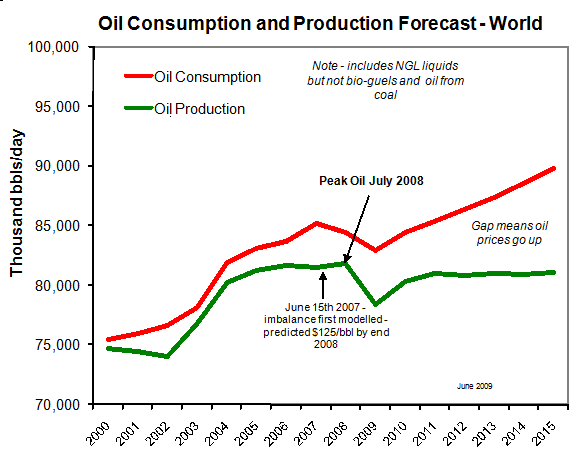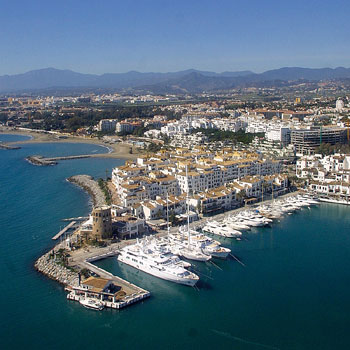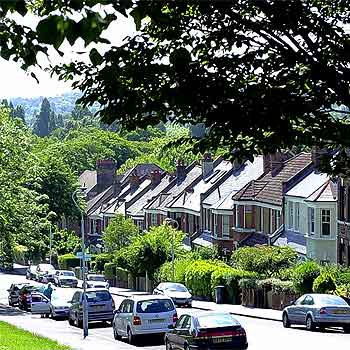312: Oil prices already at danger levels - property investing insights
04-02-2010
![]()
PropertyInvesting.net team www.google.co.uk
More objective guidance and insights for property investors. Our aim is to help you improve your investment returns, flag key risk areas and stimulate strategic thought so you can position your portfolio to maximize gain, for the 36,000 daily visitors to the website and the thousands of people signed up to your Newsletter. This Special Report focusses on UK property investing with an eye on  worryingly high oil prices, Peak Oil and other macro-economic factors.
worryingly high oil prices, Peak Oil and other macro-economic factors.
Warning – oil prices rise into danger territory: Are the speculators are back? Oil prices reached $85/bbl on Thursday 1st April. OPEC claims to have 4.5 million barrels of oil a day in reserve – but we frankly don’t believe it. It’s probably more like 2 million barrels mainly from Saudi Arabia – and of lower grade heavy sulphurous oil. Meanwhile the Chinese economy continues to motor onwards driving the economies of all resource rich countries around it – including Africa and Australia. Global demand for oil is picking up sharply in the developing world, and oil demand declines have stopped in the developed world - US demand is edging higher. A wave of new oil production came on stream in 2009 after oil prices rose between 2000 and mid 2008, but little net additions are expected in the next few years because investment was curtailed for a year. The wildcard is Iraq – and eventually their production will increase dramatically – but the impact of this is a few years away (last month saw an oil production decline). It should help save the day - but we have already built this into our forecasts for Iraq oil increasing from 2 million bbls/day in 2010 to 5.5 million bbls/day by 2015. If this does not materialise, oil production rates will start a decline in 2012 instead of stay on plateau. We expect an oil supply crunch to start showing some signs in the next few months – a tightening of supplies only at this stage - but enough to excite the speculators who will probably drive prices far higher. Once it starts in earnest more will probably jump as in H1 2008 – using the newly printed money that the US has provided them to improve bank liquidity – and thence we expect commodities prices to be driven higher henceforth. This could lead to tears again as western developed oil importing nations feel the strain by the end of 2010 - then this could precipitate dip back into a mini-crisis situation – stagnation or recession - by 2011.

Most exposed again:
Particular countries to watch out for that have high oil imports bills, poor manufacturing competitiveness, high wages, high social spending costs, no global financial services prowess and aging populations – plus no oil, gas, coal and metals production include:-
Greece
-
Portugal
-
Italy
-
Spain
Other exposed countries are Iceland, Ireland and Hungary. Most of these countries have been getting an easy ride for many years from low Euro interest rates and low oil prices. This combined stimulation was also being helped by China providing cheap goods and services. But now as these countries shift into fiscal deficits coupled with higher oil/gas prices, aging populations and prohibitively high interest rates and high Euro currency values – they could be in a permanent recession if oil prices stay above $80/bbl. Be very careful property investing in these countries if you think oil prices will stay high – as we do. Furthermore, China will act as a drag on them indirectly – because of fierce competition for resources – oil, gas, coal, food, metals, wood etc.
Oil Prices Control Our Economies - "It's the Oil Price Stupid": The tabulation below is from our Special Report issued on 16 June 2009. It shows how high oil prices impact inflation and mortgage rates. At $85/bbl we are now into danger territory. At $100/bbl please do not expect the UK economic to grow more than 0.5% per annum. If our predictions are correct, in the next few months we will see the start of the slowing UK and US economies - just as we thought the economy was starting to gain momentum it will start to fizzle out. Yes, as we have advised before - the oil price controls the economy - rarely recognized and/or communicated. Oil prices will go up - too high - then cause the next recession - but only in western developed oil importing nations - like USA, Italy, Greece, Portugal and Spain. The UK will also suffer - less than most because it only imports about 35% of its oil and gas needs so far - though this will increase over the next ten years - by about 5% per annum. When it happens again, after may be only 2-3 years from the last time in mid 2008 - it's most likely the politicians will finally wake up to the fact. Remember the recessions of 1971, 1981, 1991 and 2008 - all precipitated by oil prices skyrocketting - its nothing new.
Runaway oil prices = runaway inflation = rates up = unaffordable debit = bankruptcy
(or inefficient interventionist bail-outs of poorly performing banks - far from the normal fundamental principles of markets).
Oil Price UK GDP US GDP Inflation Mortgage Interest Rates
$35/bbl 2.5% 3.0% 1.5% 3% (has house price rises)
$70/bbl 1.5% 1.5% 2.5% 5% (house prices stablize)
$100/bbl 0.5% 0.2% 4% 6.5% (unstable situation)
150/bbl -1.0% -1.5% 5.5% 9% (spike then crash again)
Why Are Greece, Italy, Portugal and Spain So Negatively Exposed? The bottom line is – Italy, Greece, Portugal and Spain do not generate enough exports and tax income to pay for high oil and gas import bills. And their bloated public  sectors and retirement benefits – plus high wages – makes them uncompetitive versus the developing countries with wages a tenth of the levels. As IT systems improve and more manufacturing shifts to low cost countries, these countries could be in a continuous state of decline. And this won’t help property prices of course. Meanwhile, as airline travel becomes more expensive because of rising oil prices and carbon taxes and people will prefer to go on holiday and have holiday homes – closer to home – the market for remote second holiday homes in sunny destinations will we believe suffer. Best invest in major cities where high paid jobs are being created and unit GDP created per barrel of oil used is far higher (ref: people travel by fast commuter electric trains short distances to work in profitable companies – London, Paris, Amsterdam and Barcelona are good examples). Don’t be fooled by the real estate brochures – the last thing you need is an empty holiday home thousands of miles from where you live – with local agents ripping you off, and you can’t do anything about it because it’s too expensive and time consuming to travel there to meet face-to-face. Another consideration is that, if and when these countries – Italy, Portugal, Greece and Spain get into severe trouble with their deficits and Germany and France refuse to bail them out, their only option is to leave the Euro and deflate their currencies – the big Euro experiment will have failed. Then you could lose 40% on your property value through a currency crash against Sterling (if you are a UK resident) or Dollar (if you are US resident).
sectors and retirement benefits – plus high wages – makes them uncompetitive versus the developing countries with wages a tenth of the levels. As IT systems improve and more manufacturing shifts to low cost countries, these countries could be in a continuous state of decline. And this won’t help property prices of course. Meanwhile, as airline travel becomes more expensive because of rising oil prices and carbon taxes and people will prefer to go on holiday and have holiday homes – closer to home – the market for remote second holiday homes in sunny destinations will we believe suffer. Best invest in major cities where high paid jobs are being created and unit GDP created per barrel of oil used is far higher (ref: people travel by fast commuter electric trains short distances to work in profitable companies – London, Paris, Amsterdam and Barcelona are good examples). Don’t be fooled by the real estate brochures – the last thing you need is an empty holiday home thousands of miles from where you live – with local agents ripping you off, and you can’t do anything about it because it’s too expensive and time consuming to travel there to meet face-to-face. Another consideration is that, if and when these countries – Italy, Portugal, Greece and Spain get into severe trouble with their deficits and Germany and France refuse to bail them out, their only option is to leave the Euro and deflate their currencies – the big Euro experiment will have failed. Then you could lose 40% on your property value through a currency crash against Sterling (if you are a UK resident) or Dollar (if you are US resident).
UK Investment Safe Haven: For UK investors, the south of England is getting more crowded, less building is taking place and wealth is increasing along with the population and number of high paid jobs. Even higher taxes does not seem to impact in view of the sheer number of high paid jobs and economic activity. People are still buying second homes, they like to spend weekends on the south coast and its difficult to imagine a major recession severely affecting wealth in this area – in a way, it’s the last place to feel a recession. Even when GDP dropped 7% in the last 18 months, can anyone really say they saw a big impact in London and southern England? So, our advice is, if you want a low risk and a stable environment, even though prices are far more expensive than in the north, better invest in good value property in the south of England. Prices will also be supported by international investors – capital inflows from Middle East, North America, Africa, Russia and Asia/China.
 Wealthy Baby Boomers: Remember also, all those wealthy retiring baby-boomers will likely want to live in the south of England – where it is warmer, generally less windy, has slightly stronger sun, longer days in the winter, nice market towns, lovely countryside, University cities and beaches facing south – and all close to London – where much of the country’s wealth is and most of the country’s high paid jobs are. Plus, the airports and roads network – plus rail networks - are all impressive. High speed rail links and plans are focussed on London and the Olympics will take place 2012. Little wonder so many wealthy people have moved to places like Brighton. Fifty minutes on the train to London and you can live on a south facing beach. There’s even a new National Park on the doorstep now (opened 1st April).
Wealthy Baby Boomers: Remember also, all those wealthy retiring baby-boomers will likely want to live in the south of England – where it is warmer, generally less windy, has slightly stronger sun, longer days in the winter, nice market towns, lovely countryside, University cities and beaches facing south – and all close to London – where much of the country’s wealth is and most of the country’s high paid jobs are. Plus, the airports and roads network – plus rail networks - are all impressive. High speed rail links and plans are focussed on London and the Olympics will take place 2012. Little wonder so many wealthy people have moved to places like Brighton. Fifty minutes on the train to London and you can live on a south facing beach. There’s even a new National Park on the doorstep now (opened 1st April).
Climate Change – What Next: To all the climate change fanatics and renewable energy proponents – also be careful – it may be commendable but it might get you into financial trouble. To think the world will go clean and renewable quickly is probably being very optimistic. The current fleet of oil burning cars would take twenty years to change out to electric even if there was a concerted effort to do so through  regulation and incentives. As an example, the oil used in transportation in the USA would require 750 nuclear power stations to provide the same energy – this is also the amount of 10 mln bbl/day of oil imports. Solar and wind will only make a small dent in the overall energy supply – mainly because global energy demand will be so gigantic in future with the worlds expanding population and increasing living standards for the 6 billion people living in developing nations. Over a billion Chinese and 1.5 billion Indian’s want to own a car – this will not go away. These cars will not all be electric – even if they were, massive new power stations would need to be built and they won’t be powered by renewable energy regrettably. Oil demand is set to sky-rocket but oil supply will hardly budge – as we have advised for the last three years, we are now on a bumpy Peak Oil plateau. The only net rise in oil production will come from natural gas liquids – linked to increased use of LNG, gas and oil fields producing more gas as they age. This means oil prices and inflation in the western world is set to rise and growth levels drop in developed nations. Meanwhile China (GDP 10%+) and India (GDP 7%+) will just keep roaring ahead – no-one will be able to hold them back. 2.5 billion people does not need the west to create a gigantic indigenous economy. What they are short of are resources - oil, gas, coal, metals, cement and other materials to build their new super economies – much like the USA in the 1950s. New roads, cities, rail, ports – all needs massive amounts of energy. So as oil prices rise, demand will then shift to gas. LNG and piped gas. Also coal. As western economies flirt with recessions and keep large deficits – climate change and cost of keeping carbon emissions levels low will become so expensive in an unaffordable environment – climate change will drift off the political agenda. The (often) scaremongering within the climate change community will likely die away with a few cold winters in Europe – as gas prices rise and then people lose more jobs.
regulation and incentives. As an example, the oil used in transportation in the USA would require 750 nuclear power stations to provide the same energy – this is also the amount of 10 mln bbl/day of oil imports. Solar and wind will only make a small dent in the overall energy supply – mainly because global energy demand will be so gigantic in future with the worlds expanding population and increasing living standards for the 6 billion people living in developing nations. Over a billion Chinese and 1.5 billion Indian’s want to own a car – this will not go away. These cars will not all be electric – even if they were, massive new power stations would need to be built and they won’t be powered by renewable energy regrettably. Oil demand is set to sky-rocket but oil supply will hardly budge – as we have advised for the last three years, we are now on a bumpy Peak Oil plateau. The only net rise in oil production will come from natural gas liquids – linked to increased use of LNG, gas and oil fields producing more gas as they age. This means oil prices and inflation in the western world is set to rise and growth levels drop in developed nations. Meanwhile China (GDP 10%+) and India (GDP 7%+) will just keep roaring ahead – no-one will be able to hold them back. 2.5 billion people does not need the west to create a gigantic indigenous economy. What they are short of are resources - oil, gas, coal, metals, cement and other materials to build their new super economies – much like the USA in the 1950s. New roads, cities, rail, ports – all needs massive amounts of energy. So as oil prices rise, demand will then shift to gas. LNG and piped gas. Also coal. As western economies flirt with recessions and keep large deficits – climate change and cost of keeping carbon emissions levels low will become so expensive in an unaffordable environment – climate change will drift off the political agenda. The (often) scaremongering within the climate change community will likely die away with a few cold winters in Europe – as gas prices rise and then people lose more jobs.
Not a popular message – we are trying to be pragmatic, objective and honest in our appraisal and future outlook – no-one is sure what will happen of course – but realistically with think Peak Oil (or oil scarcity) will be foremost in people’s mind by about 2012 - the reason for flagging this is we want to give the very best advice to our property investing Newsletter subscribers. And only want you to be able to seize opportunities and protect yourself from downside risks and threats.
Other Special Reports on resources and impact on property:
277: Country Ranking in a Peak Oil World with Resources Scarcity
275: Cars - The Absurdity and Necessity
274: How susceptible are countries to high energy prices? Impact for property investors..
270: Turbulence in Property Markets Caused By Oil Price Spikes and Peak Oil
265: How to Profit from Peak Oil - USA, UK and Europe
264: Another oil price spike is just about to hit us...watch out
263: Investing in Property with Energy in Mind "post Peak Oil"
262: Electric Revolution, the Environment and the Next Energy Crisis
257: Property investing, the UK economic situation and oil & gas
244: It's the oil price again - it caused the recession
243: Oil price crash sows seed for next massive oil spike
242: Oil, Cars & Property - what we'd do if we were UK Prime Minister
History of Worry: Let’s look back in history. In the 1970s, people worried about the next ice age, unions and communism. Then in the 1980s it was nuclear weapons, radiation and AIDS. In the 1990s it was  ozone. By 2000 it was Y2K computer bugs then SARS. Then it was terrorism. Then it was firstly greenhouse gases, then global warming, then climate change – be honest and say, by 2020, do you really think people will be worrying about the same thing? We think western developed nations will be worrying about oil prices, energy and recessions by 2020 and the aging population in many developed western economies – not climate change and carbon capture. Yes, there may be many more electric cars, solar and wind power, but only because oil becomes so expensive. Energy conservation and efficiency will be taken seriously. Gas powered cars may also become popular – as gas supplies remain robust and prices remain low compared to oil. Wind will expand – but will still only be a fraction of total energy requirements. Gas production will sky-rocket to help take the place of oil. Coal production and consumption will stay at similar levels to today, possibly higher with China and India’s expansion.
ozone. By 2000 it was Y2K computer bugs then SARS. Then it was terrorism. Then it was firstly greenhouse gases, then global warming, then climate change – be honest and say, by 2020, do you really think people will be worrying about the same thing? We think western developed nations will be worrying about oil prices, energy and recessions by 2020 and the aging population in many developed western economies – not climate change and carbon capture. Yes, there may be many more electric cars, solar and wind power, but only because oil becomes so expensive. Energy conservation and efficiency will be taken seriously. Gas powered cars may also become popular – as gas supplies remain robust and prices remain low compared to oil. Wind will expand – but will still only be a fraction of total energy requirements. Gas production will sky-rocket to help take the place of oil. Coal production and consumption will stay at similar levels to today, possibly higher with China and India’s expansion.
Safe Havens: So we repeat – if you want to protect yourself from Peak Oil (which in our view took place July 2008) – or a plateau of oil with increasing demand and supply shortages – then invest in net oil and gas exporting nations. The best are the most stable, democratic and developed with large land masses and small educated populations – namely:
-
Norway
-
Canada
-
Australia
These countries are resource and commodities rich countries with highly skilled workforces with high integrity, very high security and stability, in stable regions and with massive balance of payments surpluses. Their currencies will drift higher against others over time. Safe havens. Expanding populations and no issue with aging populations. Nice places to live as well. With very little corruption and good laws. Does this make sense?
USA and it’s Achilles Heel: The USA would also be very good place to property invest if only it could reduce its oil consumption to half its current levels (saving a $300 billion oil import bill each year) and reduce its astronomical healthcare bills that are running at some $6000 per person per year – that’s $1.8 Trillion a year! No wander the country worries about going bankrupt in a few years time – it’s the combined forces of expensive healthcare and high oil import bills which are completely unsustainable. The democratic system seems to be failing in view of the lack of urgency and action related to these two twin pillars that could further derail the US economy. Expect a further financial crisis if oil prices rise above $125/bbl – the first signs will start at current oil price levels. If only a fraction of this expenditure could be put towards creating a healthier lifestyle, energy conservation without gas guzzling cars, the country would massively benefit economically. But it’s not a very politically popular message “get on your bike!”. Norman Tebbitt tried it in 1982 and it didn’t go down very well! The USA has many amazing attributes – agriculture, gas, forestry, minerals, high educated workforce, speaking English the global business language, finance-banking-investing, high technology, expanding population, varied climate, water, high security, the largest coal reserves on earth, varied markets and giant economic size – but it suffers in our opinion hugely from its over-reliance on oil imports from unfriendly exporters. It’s very exposed to this. And the healthcare system is very inefficient and expensive – cost per person is the highest in the world – almost triple what the French pay – and the French healthcare is almost the best in the world. The average family of four will pay $24,000 a year for healthcare alone – it’s barmy. And President Obama’s just made health costs even higher. For property investors, expect the following:
· Depression in Detroit as car plants close and heavy industry continues to decline
· New York prospers as the banks recover – and even if they don’t – the bankers will always make money even if everyone else does not
· Florida recovers – expanding population, sunny weather, US tourism and new business moving in
· Texas booms – off the back of energy prices rising and gas production increases in the area (plus renewable energy and engineering) – also an expanding population
· California – probably stumbles from one deficit to the next – but the sheer size of the economy and masses of highly intelligent people in a sun soaked location will probably see the state prospect like it always has
· North Dakota will boom – from oil, gas and uranium extraction (a massive economic turnaround)
· Wyoming will boom – from expansion of coal, plus gas extraction
· Many mid west areas will languish – no exposure to oil/gas/coal/metals commodities and no focus areas for banking-services

We would avoid all areas exposed to automobiles – and not having strong manufacturing and financial services sectors. Land prices will likely rise as commodity prices also rise (food) and the dollar declines. Stocks are sure to stay turbulent – and many companies will struggle with higher oil and gas prices. Retail and airlines will continue to suffer.
We hope you have found this Special Report of interest to help frame your property investment decisions. We get 36,000 visitors a day seeking free insights – and we try and stay constantly informed on trends to help you – as a fellow property investor – to stay ahead. It’s not an easy business and we owe it to ourselves to stay well informed – otherwise we’ll be investing in the wrong place and that not a good place to be. If you have any comments please contact us on enquiries@propertyinvesting.net . If you have a website that you would like to link to ours, please also email us on the above – we are very please to exchange links with property investors and property related businesses-entities.
Projected GDP growth - China, India, USA, Europe (early 2008 prior to recession)


